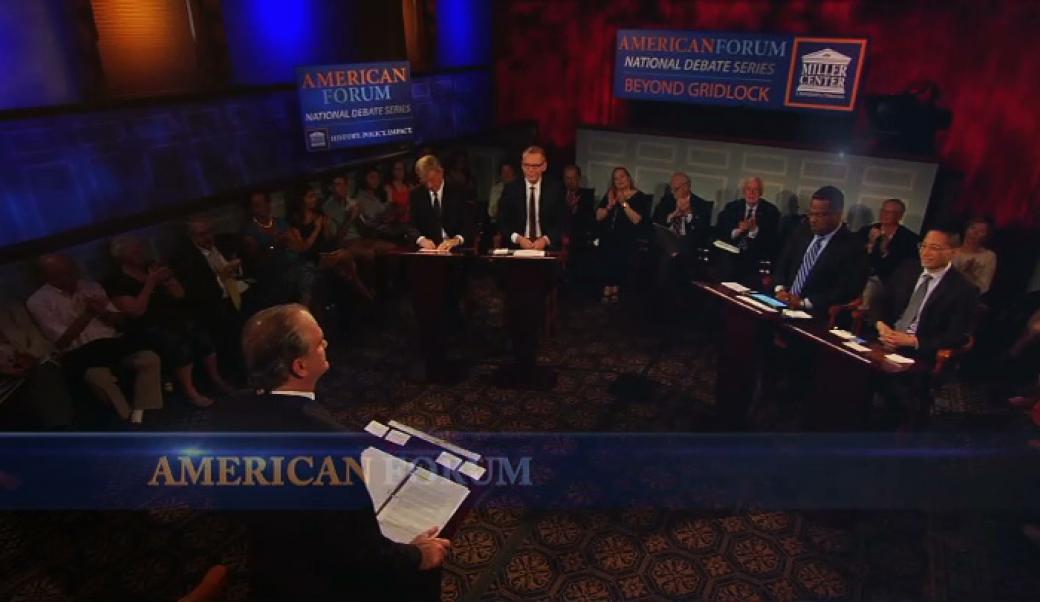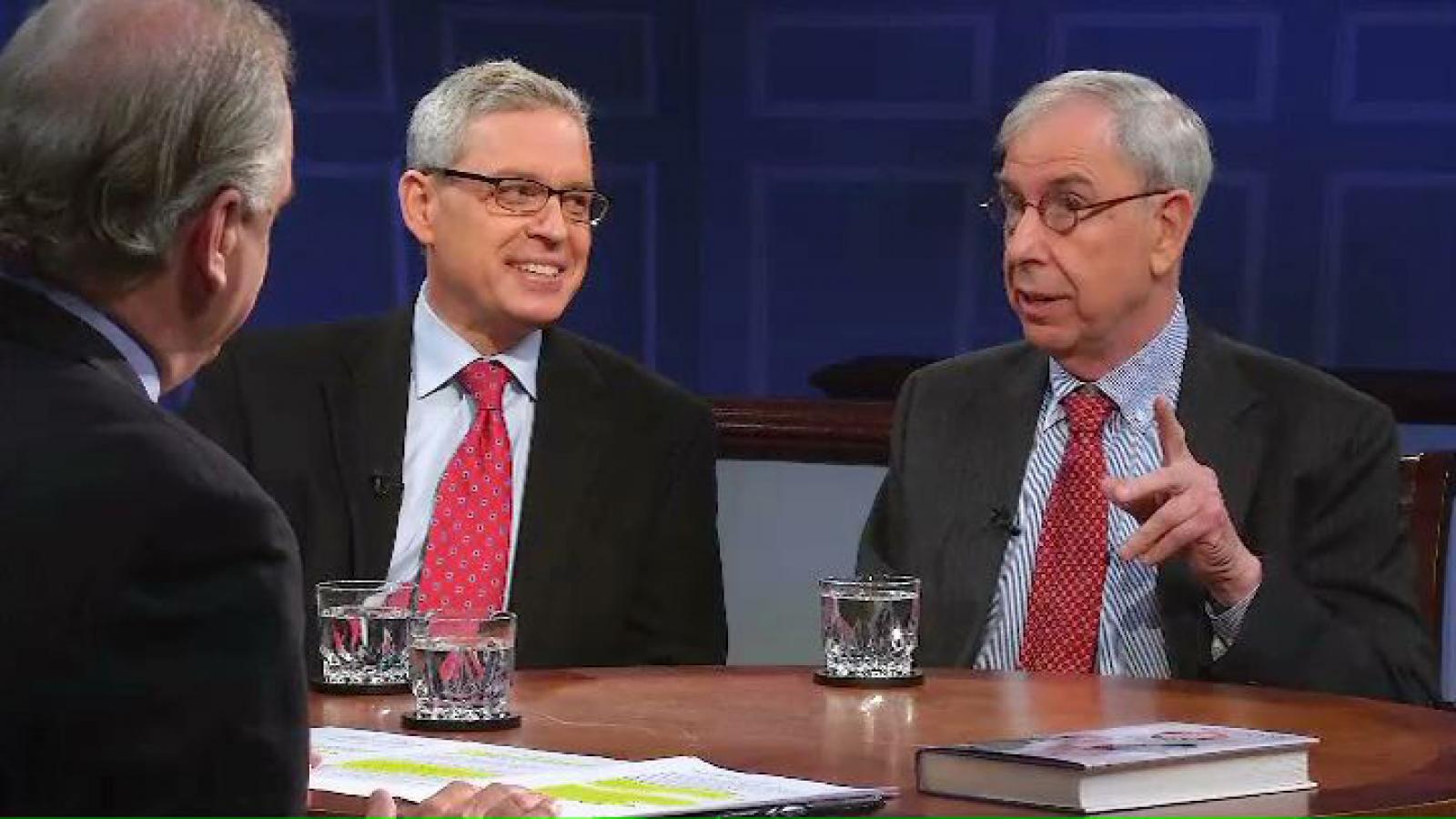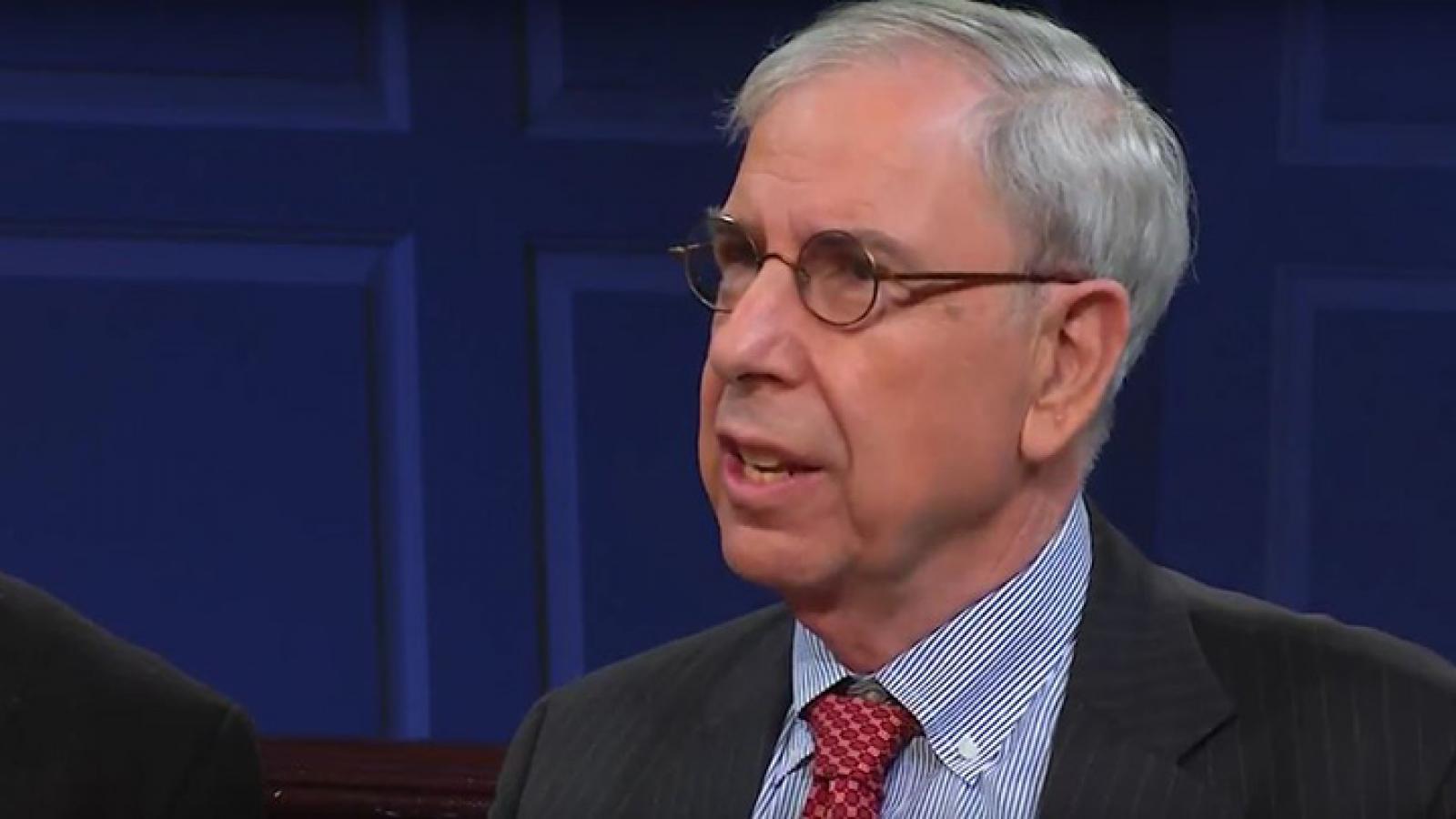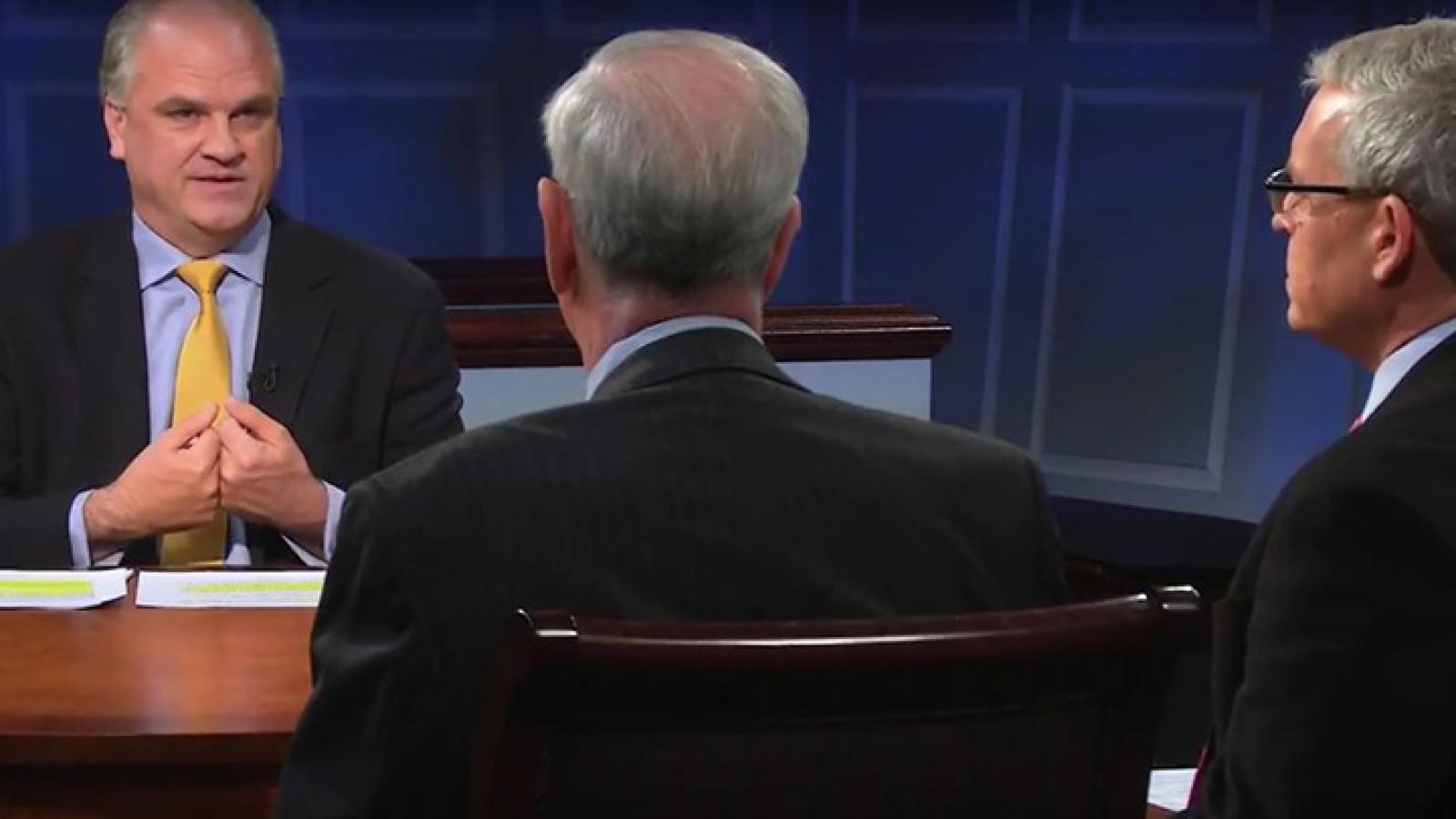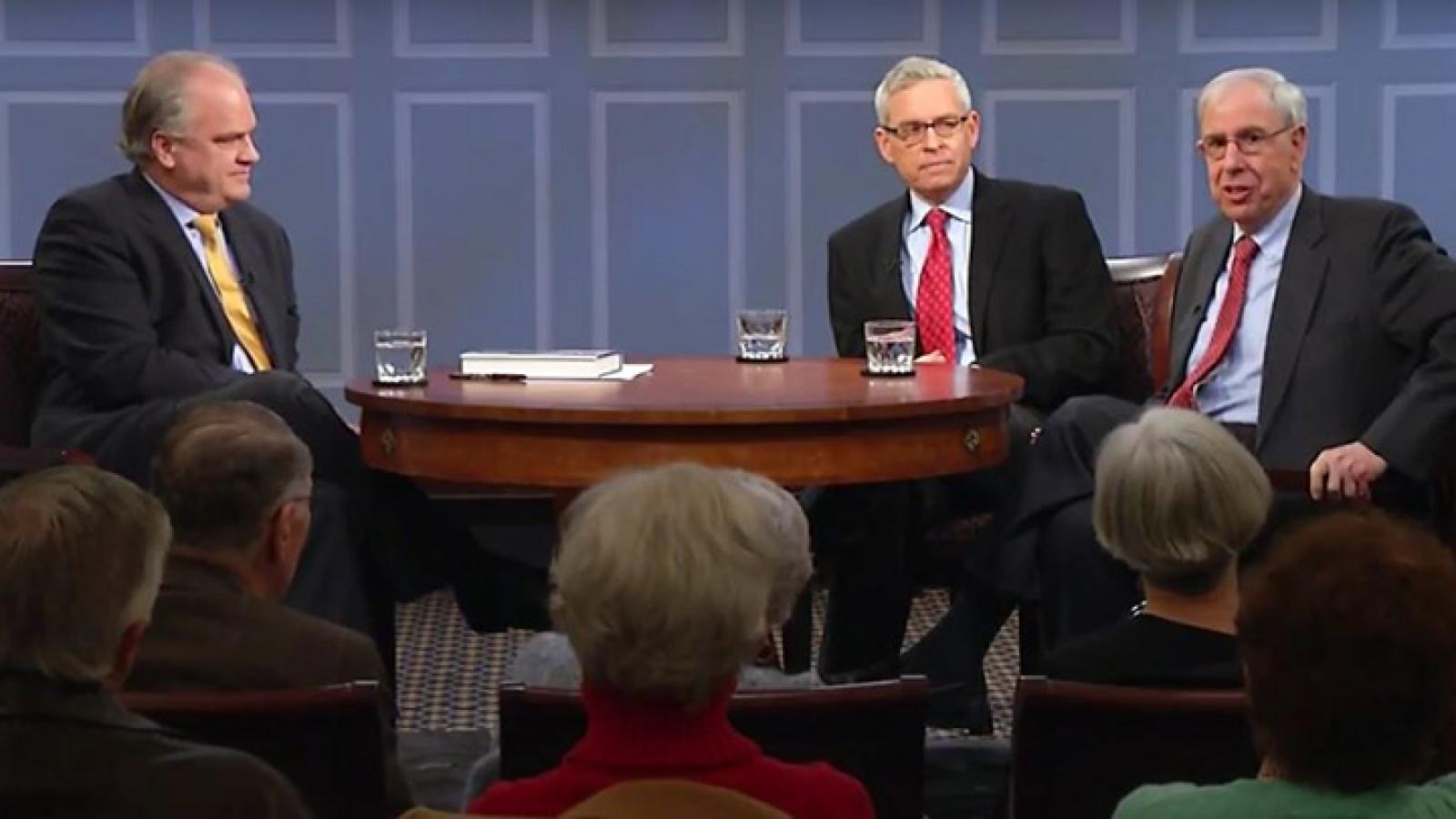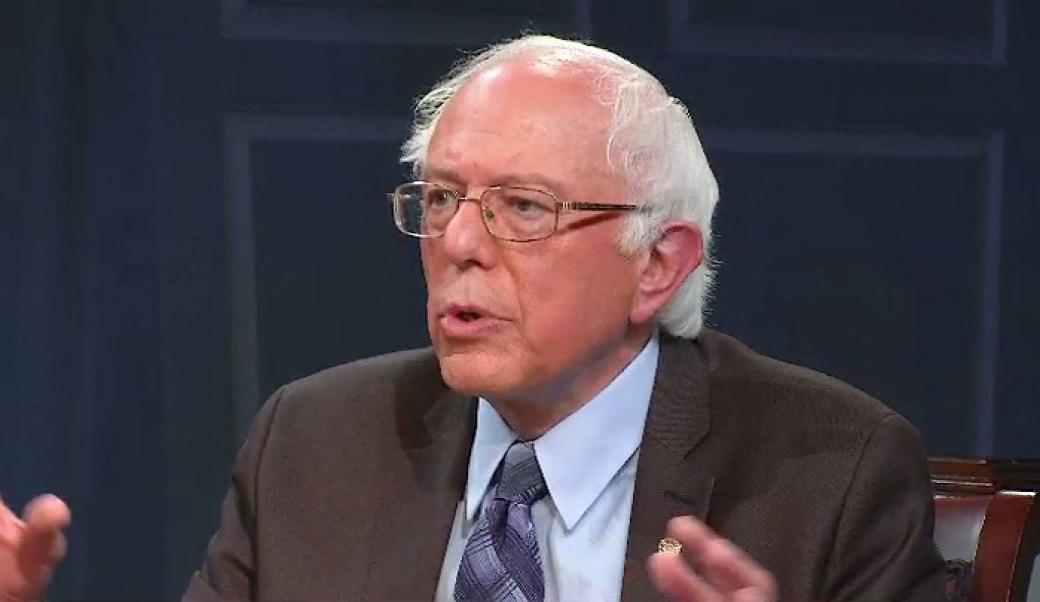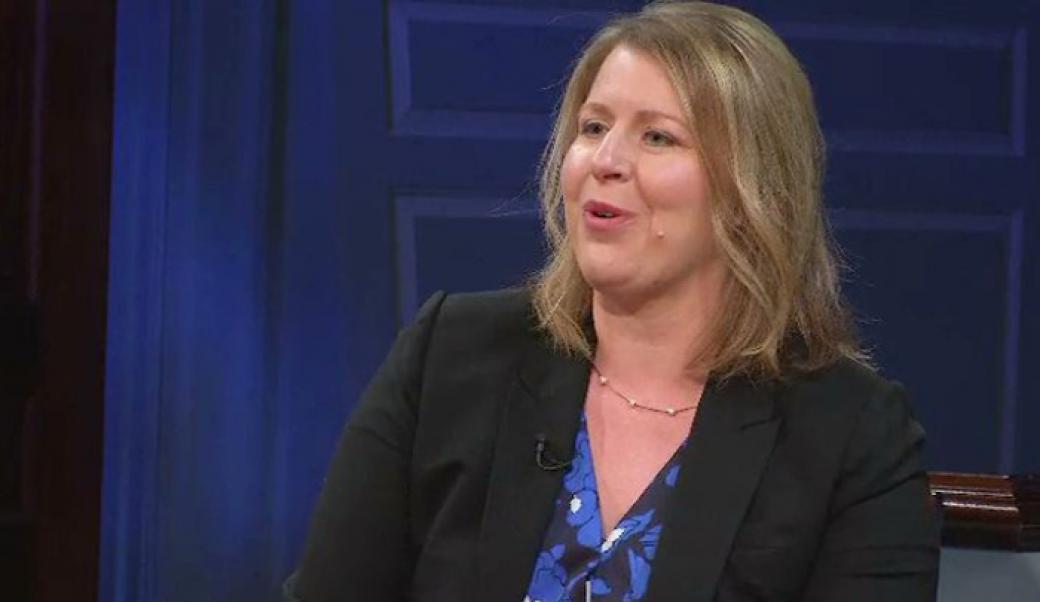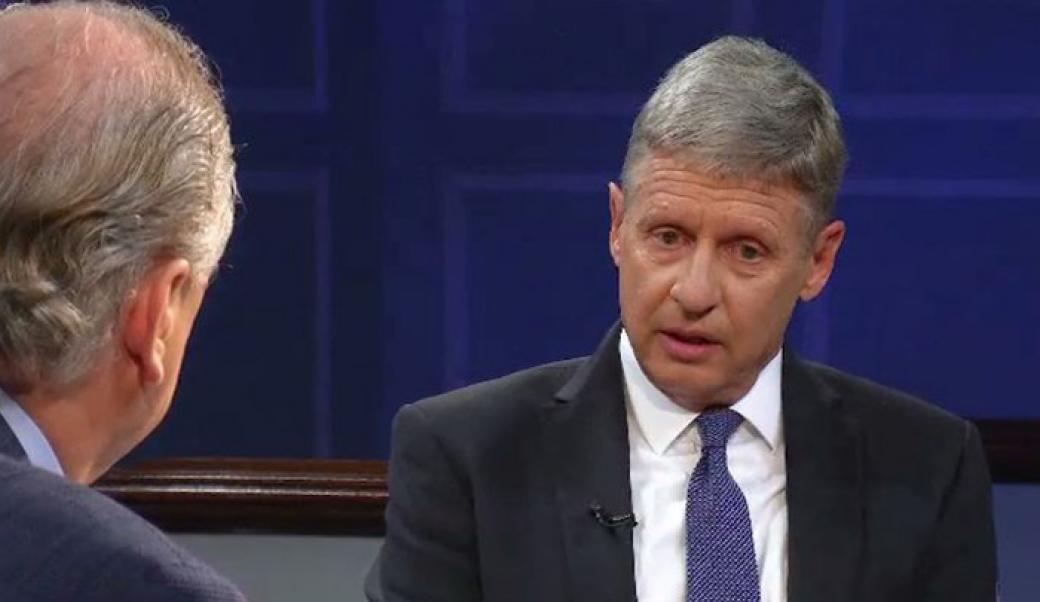About this episode
April 22, 2016
Jeffrey Frank and Will Hitchcock
Jeffrey Frank's book, "Ike and Dick," is a narrative history that explores the complicated political and personal relationship between Dwight D. Eisenhower and Richard Nixon. Will Hitchcock is a professor of history at the University of Virginia and director of academic programs at the Miller Center. He is currently completing a new book titled “The Age of Eisenhower: America and the World in the 1950s."
Political Parties and Movements
The new Eisenhower
Transcript
0:41 Doug Blackmon: Welcome back to American Forum. I’m Doug Blackmon. President Dwight D. Eisenhower occupied the White House in 1953, at a time when America was still recovering from a great global conflict, was growing weary of ongoing battles in distant countries, but also saw itself in an existential struggle with Communism and the Soviet Union. Eisenhower is remembered as a voice of reason in a time of great change in the Republican Party, and an era of spectacular social and political transformation as African Americans liberated themselves from segregation and then sharply abandoned the Republicans, in ways that would reshape U.S. politics for generations to come. Six decades later, America is undergoing another dramatic political and demographic realignment. The Republican Party is at war with itself by many accounts. The American people are frustrated with a seemingly endless conflict in the Middle East but also deeply anxious about the threat of global terrorism. So what can we learn from Eisenhower and his time, and what that may tell us about the sometimes similar challenges we face today? Joining us in this episode are Jeffery Frank author of Ike and Dick: A Portrait of a Strange Political Marriage, and Will Hitchcock, a professor of history at the University of Virginia and a Pulitzer Prize finalist, and who is currently writing an important new biography of President Eisenhower. Thanks for being here.
Will Hitchcock: Good to be with you.
2:07 Blackmon: So, we don’t want to overdraw these parallels between the time of Eisenhower and the time that we live in today, but I am curious with two people who spent a lot of time studying Ike: What would, would he recognize the Republican Party of today, and could he be a part of it?
FACTOID: The Question: What can Eisenhower teach us about today’s GOP?
Jeffrey Frank: I don’t think so. I think he would feel so incredibly distant from it. Even in 1953, he looked at the party at felt not really a part of it, and at one time he said, “I think we’re becoming the Eisenhower Party, and not a Republican Party.” At one point he even thought about a third party. He really was sui generis; he was a national hero, and he was a fiscal conservative, but he really was his own man. And in those days there was also a conflict between the two parts of the party. There was the, there were the mid-western conservatives, which had a strong isolationist strain. People like Robert Taft of Ohio. And there was the eastern liberal wing, led by people like Tom Dewey and Henry Cabot Lodge Jr. That wave has pretty much vanished, and I would say the mid-western conservative wing has pretty well vanished, too. It was a wing that still supported things like, for example, Taft was considered Mr. Republican. He supported old age pensions for everyone over the age of 65, and this was a Republican. That strain has vanished from the party, and so I don’t think Eisenhower would feel at home at all. I think he would feel this party has self-destructed, has combusted, and he would be something else today.
3:27Blackmon: Do you see it the same way?
Will Hitchcock: I agree that he wouldn’t feel comfortable in today’s Republican Party, but I think he would recognize it, and there’s a difference. It’s tempting to think that Ike could come back from the dead and take the Republican leadership to the woodshed with his favorite nine-iron and go after them, and say, “Well, come on folks get your business together.” But I think Eisenhower would recognize a strain of xenophobia, of vulgarity, of insecurity, of anxiety that we’re seeing in today’s GOP. It’s maybe not the mainstream, though it seems to have captured the mainstream in the Republican Primaries in 2016. Eisenhower would recognize that because the Republican Party in 1953 had some of those very same kinds of figures in it. We know, of course, about Joe McCarthy, and we often think that McCarthy was there in ’53 and between ’50 and ’54 raging against communism and internal subversion, but Joe McCarthy was not alone.
FACTOID: Joe McCarthy was Republican Senator from Wisconsin, 1947-57
FACTOID: McCarthy accused some in U.S. government of communist leanings
There were plenty of Republicans in the Senate, fellows of McCarthy who supported him, who rallied to him, who bayed and howled and loved it when he got into it on his various committees. And I think it is a strain that has been present in the GOP, really in American politics, which is hostility to foreigners, anxiety about internal subversion of various kinds, and Ike would say, “Look, I’m sorry this strain has persisted the 70 years that I’ve been away,” but I see some of these same figures, I mean Style Bridges of New Hampshire and William Jenner of Indiana, Herman Welker of Idaho these are names that have been lost to us now who were major figures, polarizing figures, and I would say they were off the spectrum of the right wing. They had crossed over into a kind of loony land in the 1950s, and so I’m afraid Eisenhower might say, “I know these people.”
FACTOID: Eisenhower served as 34th U.S. president from 1953-1961
The so-called ‘moderate’ running for president on the Republican side now, John Kasich, is really struggling to gain a lot of traction. I think, though, that if John Kasich had defeated Adolf Hitler in World War II and then been the head of the NATO Alliance, he might actually have a much better chance. So it’s not necessarily that moderate principles…
FACTOID: Eisenhower served as WWII general of Allied Forces in Europe
Frank: If pigs could fly!
Hitchcock: But it’s not necessarily that moderate principles in the GOP have no place. I think that it’s much less plausible than in Eisenhower’s time, but we don’t have a very lively, national, credible voice of those moderate principles and if John Kasich is the figure left to carry that legacy, he probably won’t go very far.
Frank: Well if there was one Republican that would come out to have hearings for Obama’s Supreme Court Justice pick, I would say maybe there’s a little moderation left in the party, but I don’t think one has come forward.
6:11 Blackmon: Two, I think two in the Senate, but no candidate, no candidate.
Frank: They’ve reneged. They’ve gone back, I think.
Blackmon: Well I think one maybe said we should have hearings and another said, “I’ll have breakfast with him to tell him why we’re not going to have hearings.” I think it’s sort of along those lines.
Frank: And that’s moderation today.
6:25 Blackmon: And underscoring your point, we should note that when John Kasich was siting in that very chair, I asked him if he was the moderate among the Republican candidates, and he said, “Absolutely not. I’m no moderate.” So along those lines, am I right that he also, a bit like Colin Powell in more recent times, but that Eisenhower for a long period of time it wasn’t clear whether he was a Republican or a Democrat.
Frank: Well that’s true. Well he was being a military man it was very difficult for him. He was actually forced to come out in January 1952, the year he ran for president was the first time he announced, “Well, I guess I’m a Republican.” And he was getting calls from Henry Cabot Lodge and so on basically to come out and admit it.
7:02 Blackmon: And then once in office, he contemplated changing out Richard Nixon as vice-president. I mean, he had some difficulties with Nixon and, so, even once in office clearly seemed to be struggling to some degree with being a true partisan and others who are more partisan than him.
FACTOID: Richard Nixon served as Eisenhower’s vice president
Frank: Also, as for Eisenhower being a Republican, it is also worth remember that before he announced his party affiliation, Democrats were after him. Democrats wanted him to run, even in ’48 they were talking about it. And people like James Roosevelt and Franklin D. Roosevelt Jr. and the Americans for Democratic Action wanted Eisenhower to run as a Democrat.
Hitchcock: And Harry Truman, in fact, famously in 1945 said, “Ike, I’ll do anything for you, and that includes you being the next president of the United States.” He urged him on. Of course that’s very interesting given that they then became terrific enemies, and really didn’t talk to each other for years after the 1952 campaign because it was so bitter. But it’s true his own affiliation was unclear publicly, but he himself said he was always a lifelong Republican, and that his family had been, and that he had deep Republican roots. He just didn’t want that to be known. I think it’s both one of his most appealing qualities that he was non-partisan, or he appeared to be non-partisan, but I think it’s also one of his, an area in which one could criticize him. It turns out he was a rather poor party leader. He didn’t leave a great legacy as a Republican leader. He didn’t leave the Republican Party in a strong enough position to carry on after him, and I think that’s really the test of a political leader, not just a national leader. You want to build up a party, you want to have others who can carry your ideas forward. He tried to pass the torch to Nixon, but he didn’t really believe in Nixon and the consequences were defeat for Nixon in 1960. The modern, or moderate, Republican Party that he hoped to build, he tried to call it “modern Republicanism,” was not successful.
FACTOID: In 1952 election, Eisenhower ran against Democrat Adlai Stevenson
8:58 Blackmon: Here was a time after a terrible war, another ongoing uh, seemingly intractable conflict still out there, another one on the horizon that Eisenhower stayed out of, but the, but a country that’s weary of a lot of foreign engagement at the time, also very concerned about Communism and about the possibility of, of atomic war. And Eisenhower’s response to that is very much so to, to keep everyone calm (Frank: Yeah.), to try to manage it. And it’s another thing that, that I find interesting to compare to the present in the sense of that we have a similar kind of weariness about international conflicts and engagements there, also have a similar kind of anxiety though now it’s about uh, it’s about terrorism related to the Middle East and such, and the sense of, something of a sense of existential threat, probably overrated, but some of that. But our politics now is very apocalyptic, it’s the opposite, where all we hear all the time is that we’re on the verge of a terrible apocalypse unless I or my party is in power. Eisenhower took a very different approach.
Frank: The, the, the tone is very different today, I mean the Republicans are saying, the, Obama is actually in the polls is running at about 50 percent, and if you listen to the Republicans you’d think he was running at about 30, 30 percent or something, and he’s not. But Eisenhower, Eisenhower tried to calm the country and I think he succeeded to some, to some degree. But one thing, that I keep thinking that Eisenhower and Obama have in common is a sort of personality, they’re, they’re, they’re both, they’re calm people, they’re patient people, and they don’t, they don’t jump into things without, without rethinking them through. And that’s a great quality that Eisenhower had really saved us, really saved us a couple of times when other people were talking about intervening in, in, in, for example in the, in the Indochina War and so on. Obama has that same quality, I don’t know whether it’s, let’s just think this over, let’s not make any mistakes, let’s think about the consequences. Eisenhower, when he was talking about the, about being involved in Vietnam in the, in the 50s, he said if we send one serviceman in, we’re in this. Our, our, our national prestige is at stake. He understood, he understood what, what that would mean. And I think Obama does to some extent too, he just doesn’t have the ability to get on television and, and change the mood of the nation as Eisenhower somehow could.
11:08 Blackmon: Well and, and in that period of time though, we also our, our equivalent maybe to the apocalyptic voices of today would have been McCarthy or the others who, these very loud voices of that the threat from the Soviets is even bigger than we imagine, and the threat from within, and the uh, we have to be careful about who we allow to be in the country and make sure that we know about everyone’s allegiances. Today, it doesn’t, we don’t seem to have the same reaction to what you could call Islamophobia, some people talk about Islamo-fascism. Has America lost some instinctive rejection of extremism that finally manifested itself in those days?
Hitchcock: I, I, I would, it’s an interesting question, but I think if we to start with the’50s, I would say this was not a calm era, an era of happy-go-lucky, uh, prosperity in which everybody was just, uh, talking to their neighbor and people were uh, unnaturally nice in the ’50s and that we’ve become angry since. The the phrase that Eisenhower often used while president, especially in the first years of his time in office was an age of peril, we live in an age of peril. He did not sit quietly in the White House and give lectures saying everything is going to be just fine, everything is terrific. He said we live in an age of peril, we have a nuclear peril when we’re building bigger and more powerful weapons and the Soviets are too, we have the peril of communism internally subverting our system of government, we have the peril that we might have to build so many weapons that we’ll go bankrupt doing it, and the consequences will be terrible for the government. Our federal budget will explode; we won’t be able to sustain our way of life if we go broke; inflation will take over. He talked about this as president quite a bit, what’s different is that he was also a great balancer. He also found a way to pivot and to say but we can overcome the age of peril and turn it into an age of prosperity in the following ways, and he usually said something hokey like “if we are good Americans.
FACTOID: In 1951, Eisenhower became commander over NATO forces
FRANK: He was, yes, he really worried. He had a conversation with Clare Boothe Luce who was the wife of the publisher of Time who was a slightly, slightly deranged woman at times but she took pretty good notes. And he told her, he said “I worry, I worry that what to do about the nuclear war, that, that they could be launching the first strike. What should I do? It keeps me up at night.” And he was under enormous strain that he, that he I thought hid pretty well. But uh but he was but I don’t think he ever tried to scare or did scare the country very much. There were a couple of times when no, I don’t think he ever scared the country. There was, there was a moment when, when there was some alarms that war was imminent, particularly over these two completely irrelevant islands, Quemoy and Matsu. But it never, it never happened.
Hitchcock: I will just note that Eisenhower did agree to an armistice in Korea, and, and thank heavens. It was a miserable war and he stopped the fighting, or, or participated in
stopping the fighting.
FACTOID: Korean Armistice Agreement became effective in July 1953
But it’s important to know that because as historians we know how that actually worked out, and it wasn’t just that Eisenhower woke up one day and said I think I’ll end the Korean War. What we know now is that when Stalin died in March of 1953, uh, the message got through from the Russians to the Chinese that they were getting tired of the Korean War, that it was draining a lot of resources, and that it was a bad time for the, the communist powers to get, to go toe to toe, uh, with the United States, or to continue that war. They were losing interest in it, it was draining immense numbers of lives and resources, and the Chinese began to pull back the lever, and they pressured the North Koreans to agree to an armistice. At the same time Eisenhower was actually talking about increasing the fighting in Korea, he was thinking not just about ending it with armistice but ending it by victory and in his national security council meetings, and we know this because we have, we have them, he discussed whether or not, if they were going to expand the war in Korea, whether they should use atomic weapons, so, this doesn’t mean he planned to use them, but he talked about it, And I think this is the essence of Eisenhower is that he took every contingency plan very seriously, thought it through, thought about the consequences, but at the end of the day, the reason the Korean war came to an end was partly because Eisenhower was willing to accept an armistice but also because the north Koreans were willing to accept one as well.
Frank: And also, because, yes, he sent a very clear message, I guess through, through India that was, we would use these, these weapons. Would he have really done it, I don’t think so.
15:23 Hitchcock: But he talked a lot about, in public, not just the mistakes, but in public he often used nuclear brinkmanship to say, nuclear weapons are just like uh, a bullet, we should use them in other cases, if we need to.
Frank: Well then, that one he took, he took back, the bullet, the, the bullet.
Hitchcock: But privately, privately, he would say to his advisors, this would be a terrible thing because it probably would trigger a response and then we would be in world war 3.
Frank: After he visited Korea, he had an immediate meeting with, with General MacArthur who offered him his plan to, to end the war, which was to basically lay waste to the country with radioactive, radioactive, bombs all the way to the border and then, and basically making, making the whole country uninhabitable for the next thousand years, and that would have, that would have ended it too.
16:04 Blackmon: Sounds a bit like Senator Cruz’s plan for Syria. Um, uh, the, the,
Hitchcock: Bomb it until the sand glows.
Blackmon: But isn’t it remarkable that, uh, that that this unfinished business on the one hand, it is this great uh, success, uh that that, the that the fighting and the killing of Americans at least, ended, uh on the Korean peninsula, uh as a result of that, but the unfinished nature of it also leaves it as what is still the most substantial and serious and dangerous relic of the, of the cold war, that still has to be faces by our national leadership today?
Frank: That is a personal reason, too. His son was, his son was serving over there, John was serving in Korea, and I think I said, uh, it’s great that the war is over, my son will, my son will come home.
16:45 Blackmon: You could be describing uh, exactly the, what has been talked about many times at this table over the past year. You could be describing precisely the kind of uh, process and dialogue that uh, that president Obama and his own cabinet struggled over in terms of intervention in Syria. I mean the, the, what we now know is that oversimplifying the story, is that, it ultimately was the president himself who made the call that we would make a much deeper engagement in Syria other than the, the kind of secret boots on the ground that we have there now, over the recommendations of secretary Clinton, and over the recommendations of Defense Secretary Gates, uh, so, but very similar, if you tried to. those are quite parallel kinds of situations.
Hitchcock: Yes, very much so. And I predict that, that will be seen as, in a much more positive light in the future, uh, to stay out of that region, uh, than it has been now, and the reason that I predict this is because that’s how it worked out in the past. Eisenhower was actually vociferously criticized in the press and in the public and in Congress uh, for not sending in troops into Indochina in 1954, we often think, well, what a wise man he was, and how much credit he probably got at the time for not getting us entangled in that terrible Vietnam war. On the contrary, he took a beating, and he didn’t care. He said I, we send troops into Vietnam, we’ll be there for decades, it’s a terrible idea.
Frank: And the parallel today is, is Libya, isn’t it? In fact, that is what, Obama did not want to get into Libya, Secretary Gates did not want to get into Libya and he was pressured by, by, by Mrs. Clinton, secretary of state, Samantha Powers, I forget what her role was then, and he finally allowed us to participate, and we can see the results, and we see the results in the campaign, too.
FACTOID: Samantha Power is U.S. ambassador to United Nations
Hitchcock: I think, the country, I’m going out on a limb here, but surely the country’s tired of war. We’ve been at it now for a decade and a half, we recognize we have responsibilities in crucial parts of the world, we’re not going to give those up, but nonetheless, the kind of relentless sacrifice of young people that uh, that has marred our political landscape, um, is now, Obama has dialed it back. He’s taken a lot of criticism for it, and we’re, we don’t know how it will work out. It may be that we’ll have to ramp them up again. But I agree with you, I think there are some echoes here, and uh, I think that it’s, it’s telling that these decisions have come in the latter part of Obama’s presidency, as he has learned how difficult it is to be the commander in chief. What the consequences are of being a country constantly at war, the sacrifices you have to make. Eisenhower knew that going into the presidency, he had that advantage, and I think that may have played some role in his decision to grasp the armistice in Korea early.
19:07 Blackmon: It is important to remember that the brown v board decision in 1954 that finally, legally says that segregation, uh, should not exist anymore, and begins the liberation of African Americans into a full citizenship and American life, so that’s right at the very beginning of Eisenhower’s presidency. At that point, sometimes we get the story a little wrong when we talk about where, uh, black voters were at different times. Uh, and we sometimes say that the transition of African Americans from republicans and from the party of Lincoln and the party of Emancipation, that that happened with FDR, and uh, in the thirties and the forties, there are signs of it, in that period of time, but in reality it’s much later, uh, and in the 1950s and Eisenhower’s Republican Party was one that still had a substantial African American presence.
Frank: Eisenhower got forty percent of the black vote when he ran for president. Nixon in 1960, even, even after disregarding of the pleas from Doctor Martin Luther King, still got 32 percent. It was the next election where it happened. Goldwater, I think the African American vote was like seven percent for Republicans, and they’ve never recovered from that.
FACTOID: 2012:GOP candidate Mitt Romney won only 6% of black vote
20:06 Blackmon: Yeah, so that’s a change that, that had, uh, implications for, really for generations and appears to still be largely, largely fixed in place, uh, then, uh, at the same time, Eisenhower passed a civil rights legislation, at the, near the, in the latter part of uh, his term in office, that is somewhat forgotten now, but was actually rather important, but so, how was it exactly that, that that in that span of time, was it just that Goldwater was such an offensive figure to, to African American voters, or, what was happening inside the republican party that set in motion this abandonment by African Americans?
Hitchcock: Eisenhower could have become one of the great civil rights presidents of, of the last half century if he had wanted to. He didn’t. and that’s what was happening inside the republican party, it was a choice in a sense, to go so far but not further. And I’ll tell you, it’s easy enough to indicate how much he did, and how we often forgot Eisenhower’s role. In 1953, he participates in the desegregation of the federal workforce, imposed by democrat Woodrow Wilson at the turn of the century in 1912. Desegregation of the federal workforce, he demands to desegregation of military and naval bases, which had still not been desegregated despite Harry Truman’s efforts. He, um, and his attorney general file friend of the court briefs in a decision that would ultimately desegregate eating places and movie houses in Washington, D.C. He said right from the beginning, there will be no segregation on deferral lands, on federal territory; it’s outrageous that there should be segregation. This was before Brown v. Board. Then he appoints Earl Warren to the Supreme Court, and then we get Brown versus Board, and then Eisenhower says, maybe we’ve gone just about as far as we need to, uh, things are going a little too quickly, and he signals, and with, through his attorney general, that for Brown II, the second decision that came out supporting, how do we actually implement Brown v Board, he favored a very, very much a go-slow approach.
22:00 Blackmon: Did the party at that stage uh recognize that that the departure of African Americans would ultimately become so significantly a thing. Did they simply fail to recognize that, that it, this could have a long term damage to the party?
Frank: Well Vice President Nixon who wanted to keep the African American vote, he worked hard to keep it. Uh um in the ’50s he was, he was the one who was basically the point man on the 1957 Civil Rights Act. It was actually Nixon who was the one who, who, who, who, who, who wanted to, to, to, to uh take the, the uh voting rights questions out of, out of juries and give it and give it to a judge knowing that if, knowing that if a southern jury was going to convict someone uh uh for that. So Nixon was actually the one who pushed it through and Nixon was the one who became friends with Dr. Martin Luther and you got, he arranged a meeting with King and Civil Rights leaders with Eisenhower. But, but any way but but that was but it was but then it then it was abandoned and then by the time Goldwater, Goldwater opposed the Civil Rights Act of the, and that counted a lot against him.
FACTOID: Voting Rights Act signed by President Lyndon Johnson in 1965
Hitchcock: It’s fascinating to read the documents in the Eisenhower library because they talked a lot about this, they spent a lot of time on it, Eisenhower himself not so much, but many of his advisors and it took a great deal of internal politicking to get an agreement by Eisenhower to meet with African American leaders. It happened in 1958 once and it was, and Eisenhower’s view was if I meet with that group of special interests then I would have to meet with Lithuanian Americans and then I’ll have to meet with Italian Americans. That’s how he viewed the problem, now compare that to our contemporary world and you see how far we are away from the 1950s and I think that’s how he approached the problem, as one that was going to be tricky that in which he might get embarrassed, in which something he might give a commitment he couldn’t keep.
23:38 Blackmon: And so that also sharply brings us to the present parallel which is that some of the things that are being said, some policies that are being proposed in the Republican primaries would separate Hispanic voters now. The fastest, the most fastest growing most dynamic minority in the country. Is there a lesson for the Republicans today in seeing how badly some of this turned out for Republicans back in the late ’50s early ’60s?
Hitchcock: Look, Eisenhower was a unifying figure, not a polarizing figure but he also did not emphasize very many, of what we would call hot button social issues in public. He didn’t talk, he didn’t run on a platform of about immigration for example, he didn’t run on a platform about gun rights, he didn’t run on a platform of abortion, pro or con, these are not issues in the political blood stream the way that they are now. It is these social issues that have divide Americans and will continue to divide us until we come to some kind of national consensus about them. Eisenhower had the good fortune of living in a time in which those kinds of things were still thought of as either private issues or just haven’t become the great the great, third rails of of the time that they are now, so I mean I think as we look back on Ike and say could we ever find another Eisenhower again, I think the chances are very unlikely for some of the reasons that Jeff has said. We really have two parties that simply do not know how to talk to each other, don’t know how reach or not even trying to reach a full and completely national audience.
Blackmon: Jeffrey Frank, Will Hitchcock thanks for being here. Jeff's book is Ike and Dick: A Portrait of a Strange Political Marriage. We hope all of you, now watching American Forum on nearly 300 public television channels across the U.S., will keep this conversation going. That’s what the American Forum is about. Every week. Dialogue. Discussion. Being aware of the lessons of history—and respectful of the views of our fellow citizens—even the ones we disagree with. And we invite you to directly join the conversation with American Forum on the Miller Center Facebook page, at millercenter.org/americanforum, or by following us on Twitter @douglasblackmon or @americanforumTV. I’m Doug Blackmon. See you next week.
